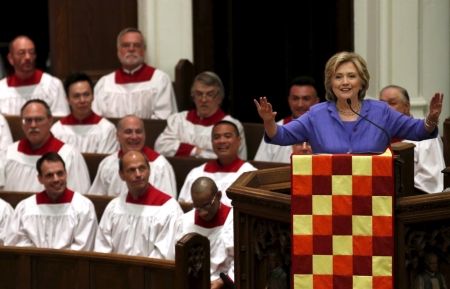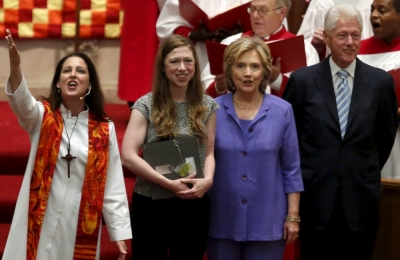Hillary Clinton's Foundry United Methodist Sermon: 'We All Have Different Gifts'

Editor's Note: The following sermon was delivered by Hillary Clinton at Foundry United Methodist Church, Washington, D.C. on Sept. 13, 2015. Clinton formerly served as U.S. secretary of State, U.S. senator and first lady. She is running for president of the United States.
Good morning. This is the day the Lord has made; let us rejoice and be glad in it. And especially for this occasion, a remarkable event that we are celebrating together. I am so glad that Chelsea and I could be part of it. I thank you for that invitation.
I was thinking, as Chelsea was speaking, how unpredictable, even serendipitous it turned out to be that we ended up at Foundry. Some of you may remember it was not too long after the inauguration. It was a Sunday. We were already getting kind of stir-crazy, and so we thought, "Let's go to church." Now, this was a long time ago — 1993. There had been a big storm in Washington. The drifting snow was stacked in the streets and on the sides. We had the idea that we would find a Methodist church and walk from the White House. I don't know who was there that day. Some of you were very, very kind in bringing us in. This was the time before metal detectors and all of the hyper-security that we live with today. We just walked out of the White House followed by some bewildered Secret Service agents and made our way to church. And from that moment until this, we have always felt so welcome.
Chelsea has just described how much Foundry meant to her, and I can only echo that as her mother who saw how embraced she felt here in this congregation. This community — because indeed that's what it is — was a place where we could worship, study, contemplate, be of service, get some good pastoral advice, and step outside all the commotion of life in the White House and Washington. That was very, very precious to us. Here we were, not "the First Family" — we were just our family. And we relished and cherished that time. We always have felt part of the Foundry family. …

As I was listening to Chelsea and remembering those early weeks and months here in Washington for us, and how thrilled I was that she found so much support here, I of course thought about my own Methodist church growing up in Park Ridge, Illinois, where I had the same kind of experience.
I am a Methodist both by birth and by choice. I was born into a Methodist family — parents, grandparents, great-grandparents, claiming to go all the way back to the coalfields hearing the Wesleys preach. Now, as with so much inherited family lore, I am sure the press will dive on that and try to figure it out. All I can tell you is what my grandparents told me.
And that church really opened my eyes, my mind, and my heart — especially my youth minister, who forced us out of our comfort zone, who made us have to really live in what John Wesley called "his parish," meaning the world, in ways that were a little bit discomforting, to be fair. This was a youth minister who said no, you can't just be sitting satisfied in your own church in a suburb of Chicago that was all white. We're going into the inner city of Chicago. We're going to go into church basements and have fellowship with youth from African American churches and Hispanic churches. We're going to sit and we're going to talk about our lives. And we did.
A youth minister said one day, "I'm going to go see Dr. Martin Luther King, Jr., speak in Chicago. If your parents will let you go, I will take you." My parents let me go; not every parent did. And we got in that church van and we went down to Orchestra Hall and we heard Dr. King. And I remember standing in that long line just to shake his hand after hearing one of his famous sermons, "Remaining Awake Through A Great Revolution." I've read that many times since, trying to absorb even more than the first impression that I felt so strongly. I left that hall a different person thanks to my church.
When I went to college, I looked for a church and I found a Methodist church that once again I felt could be part of my new experience, my own journey. And in place after place after place, the Methodist church and my fellow Methodists have been a source of support, of honest reflection, of candid critique.
I got some advice from Dr. Wogamon just earlier this morning. Which I promise I will put into effect. He basically said, "You know, if you're going to read and listen to Romans 12, you've got to be nicer to the press." So, to my friends in the press, I will certainly take that to heart.
Now, I attribute not only my church relationship to my father's family, because that's where it came down to me, but to my mother. She taught Sunday school. She said later she did it to make sure my brothers would show up. She was very focused on the lessons of John Wesley.
She used to like to quote, "Do all the good you can, by all the means you can, in all the ways you can, in all the places you can, at all the times you can, to all the people you can, as long as ever you can."
I thought that was good advice then. It's not always easy to implement, but it's a great reminder that I carry around with me to try to get me back focused when life and its vicissitudes sometimes knock you off the path.
I've come to see how important it is that we always be asking ourselves how we do translate our faith into actions. We heard from Meaghan one of my favorite verses in Romans 12. "We all have different gifts, according to the grace given to each of us." Another lesson I learned from my mother. Abandoned and mistreated by her own family, sent by her parents to live with grandparents; rejected by them. She was on her own by the age of 14, working as a housemaid. I didn't know any of this when I was a little girl and we would go off to church on Sunday or we would do something around the house or at school. I just knew she was a great mom.
Years later, I asked: How did you keep going in the face of abandonment and rejection? How did you not give in completely to bitterness and despair? How did you keep your faith in the goodness of people and a future that could be better than the past? And here's what she said. She said along the way, someone showed her kindness. Someone showed her that they believed she mattered.
The first grade teacher who saw she had nothing to eat at lunch, and after a few days, without embarrassing her or calling attention to her, walked over and knelt down and said, "You know, Dorothy, I just brought too much food today. Would you like my extra food?" And years later, my mother realized that her teacher fed her every day.
Or even the woman whose house she was cleaning at the age of 14, who realized that my mother desperately wanted to go to high school. And this woman said to her, "If you get your work done, you can go to high school. You can leave in the morning and come right back." Now, to some that might sound harsh for a 14-year-old, but for my mother it was a great gift. So every day she would get up early, she would do her work, and she would literally run to high school, and then after it was over she would run back.
Because people believed in her, she was able to believe in herself and believe in me and others whose lives she touched, like my husband and my daughter. And she was able to give us the great gift of believing in others.
The longer I live, the more places I go and people I meet, the more certain I am that everyone has gifts to be recognized and celebrated. No matter who you are, where you come from, what your income, your race, your religion, your gender, your age, your ability — you have value. You have dignity. You have something to offer God and the world.
Now, we don't all have the same gifts and blessings, but that's okay. In fact, it's good. That's Paul's message in Romans 12. Because together, our contributions add up to something greater than anything we could offer on our own. And isn't that the goal of a community or a congregation? The meaning of what I used to call "a village." It takes a village, it takes a community, it takes a congregation to lift us all up and to empower us to do our part.





















